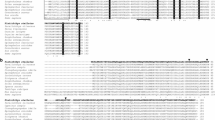Abstract.
The Atlantic salmon (Salmo salar) goose-type lysozyme gene was isolated and revealed alternative splicing within exon 2 affecting the signal peptide-encoding region. The lysozyme was produced in Escherichia coli, and the recombinant enzyme showed a high specific lytic activity that was stimulated by low or moderate concentrations of mono- or divalent cations. Relative lytic activities of 70 and 100% were measured at 4°C and 22°C, respectively, and there was no detectable activity at 60°C. However, 30% activity was retained after heating the enzyme for 3 h at 90°C. This unique combination of thermal properties was surprising since the salmon goose-type lysozyme contains no cysteines for protein structure stabilization through disulphide bond formation. The results point to a rapid reversal of inactivation, probably due to instant protein refolding.
Similar content being viewed by others
Author information
Authors and Affiliations
Corresponding author
Additional information
Received 14 August 2007; received after revision 07 September 2007; accepted 12 September 2007
Rights and permissions
About this article
Cite this article
Kyomuhendo, P., Myrnes, B. & Nilsen, I.W. A cold-active salmon goose-type lysozyme with high heat tolerance. Cell. Mol. Life Sci. 64, 2841–2847 (2007). https://doi.org/10.1007/s00018-007-7372-8
Published:
Issue Date:
DOI: https://doi.org/10.1007/s00018-007-7372-8




